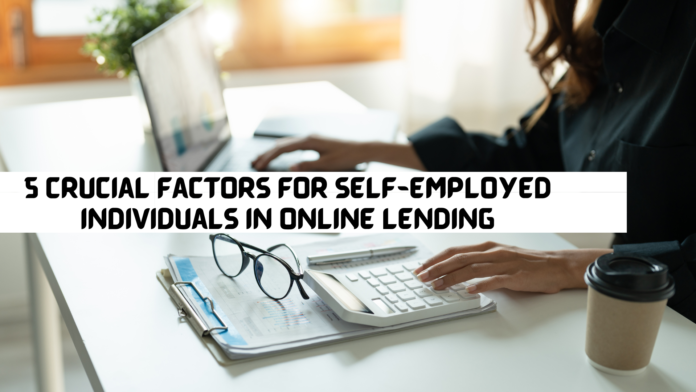Seeking financing can be a challenging process for anyone, but those who are self-employed often face additional hurdles and scrutiny when applying for loans online. Lenders rightfully have to take extra steps to verify incomes and assess financial stability for self-employed borrowers compared to traditional W-2 employees(W-2 employees are people who work for an employer and receive a regular salary or wage).
It is imperative to understand these key factors that lenders evaluate so you can be fully prepared and position yourself to secure the best possible loan terms. This guide will explore the main elements that influence lending decisions for self-employed individuals.
Proving Income Consistency as a Top Priority
For any borrower, having a consistent and reliable income is pivotal to qualifying for affordable loan rates and terms. But this factor weighs even more heavily for the self-employed. With the inherent variability and fluctuations in income most entrepreneurs experience, demonstrating stability is crucial yet challenging.
It was found that over 65% of online lenders surveyed cited inconsistent or unverifiable income histories as among the top reasons for denying loans to self-employed applicants. Unlike salaried W-2 earners with fixed wages, the irregular income patterns of entrepreneurs raise uncertainty.
Lenders will scrutinize your income from every angle to assess if it is steady and dependable enough to take on a new debt obligation. Specific factors evaluated include:
Length of time self-employed – Have you demonstrated the ability to maintain your business and income consistently over months and years? Being in business longer helps reduce perceived risk.
Revenue patterns – When reviewing your income flows over time, consider whether your revenue has remained fairly steady and predictable on a month-to-month and year-over-year basis. Spikes and dips in income can raise concerns.
Income projections – Are your forecasts for future income conservative and realistic based on existing financial documentation? Overly optimistic projections suggest unreliable expectations.
Customer concentration – If income relies heavily on just one or two major customers, this concentration poses a risk should those accounts be lost. Broad customer diversity improves stability.
While having a financial advisor helps navigate the documentation process, obtaining a personal loan preapproval online yourself first allows you to set expectations. This personal loan preapproval process gives the self-employed a preliminary eligibility assessment and estimated rates.
Assessing Business Health and Market Position
To fully evaluate loan application risk, lenders look far beyond just personal income figures. They examine the overall financial strength and market position of the self-employed individual’s business. It’s an in-depth look.
This review helps weigh key factors like what competitive pressures the company faces, how susceptible it is to economic fluctuations, and how financially sound operations appear based on profitability and other metrics.
Consumer credit reporting agency Experian says approval rates are 1.7 times higher for self-employed applicants with profitable, growing businesses. This is compared to those with flat or declining revenues.
Some specific aspects examined when assessing business viability include:
Profit margins – Higher margins point to efficient operations and pricing power – both positive for stability.
Revenue growth trends – Increasing revenues over time suggest strong product/service demand. Declining sales are red flags.
Industry outlook – A positive macroeconomic outlook for the company’s sector indicates lower business risk than a declining industry.
Business solvency – Reviewing business credit reports and payment histories uncovers red flags like prior bankruptcies or unpaid debts that raise caution.
Self-employed applicants who earn substantial incomes may still struggle to secure low-interest rates, particularly if their businesses face intense competition or operate within a declining industry. Lenders cannot overlook potential signs of financial distress when assessing eligibility.
Navigating the Income Verification Process
Securing financing as an entrepreneur doesn’t stop with simply showing you’ve maintained consistent profits. You must also be prepared to go through a rigorous income verification process. Self-employed individuals should expect to provide extensive paperwork, including tax returns, 1099s, bank statements, and other financial records.
Lenders will scrutinize these documents closely to verify income amounts, calculate important metrics like debt-to-income ratios, and ultimately gauge if projected cash flows are adequate to service new debt obligations.
Specific documentation you should be prepared to provide includes:
- Two years of complete federal tax returns
- 1099 forms from any clients who paid you
- Recent personal and business bank statements
- Business financial statements proving revenues, expenses, assets, and debts
Individuals new to self-employment frequently underestimate the level of detail lenders apply when reviewing paperwork and documentation. You can make or break your chances in this step by being responsive and transparent. Make sure to work closely with your loan officer to provide everything required.
Leveraging Business Assets Wisely
When self-employed applicants use business assets and finances to secure or repay loans, lenders take extra precautions. They will require current business financial statements and conduct a comprehensive cash flow analysis. This allows them to gauge how the withdrawal of funds may impact daily operations. They can also assess its effect on growth plans, working capital needs, and contingency reserves.
While tempting to tap business coffers, entrepreneurs must weigh very carefully how leveraging these assets will affect their future outlook. It is found that 10-15% of self-employed borrowers end up facing financial duress or insolvency due to over-leveraging business assets.
Maintaining a healthy balance is crucial; only withdraw funds that the business can comfortably afford. Keeping adequate working capital is important when encumbering business resources for personal lending needs.
Key Takeaways
Securing financing will likely demand more patience and preparation for individuals earning self-employment income compared to salaried workers. However, being ready to address the unique priorities lenders have can still make success possible.
Keep these core lessons in mind when seeking financing:
- Provide abundant documentation that income is consistent and predictable over time.
- Be ready to open your books and demonstrate the underlying strength of your business operations and industry.
- Ideally, you should have at least two years of profitable self-employment history in your rearview mirror.
- Expect to provide extensive paperwork validating your income amounts down to the last details.
- Only utilize business assets that you can afford to leverage without jeopardizing the company’s financial stability.
Meeting these criteria requires extra effort but can be achieved by most diligent applicants. While approval is never guaranteed, self-employed borrowers who check these boxes position themselves well to gain lenders’ confidence. With proper preparation, you can navigate your path to financing smoothly and successfully.
Frequently Asked Questions
- If my income relies completely on just one or two major clients, what can I do to improve loan eligibility?
To improve your loan eligibility, it’s essential to demonstrate ongoing efforts to diversify your customer base over time, reducing the risk of dependency. Additionally, provide contracts and documentation that highlight your long-standing relationships with major clients. Ensuring sufficient cash reserves to cover periods between significant projects is also important.
- I’ve been self-employed for over 20 years. What loan terms can I expect to qualify for?
With over 20 years of successful self-employment history, you should qualify for highly competitive rates and terms from most online lenders. Exceptional borrowers might even receive offers in the range of 3-5% interest rates with repayment terms spanning 5-10 years. Your personal credit history will also play a significant role in the evaluation.





